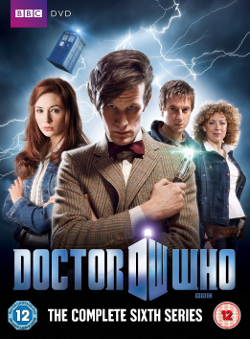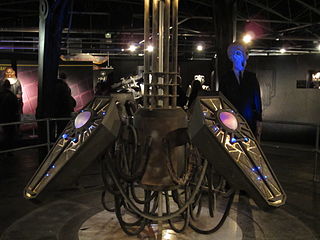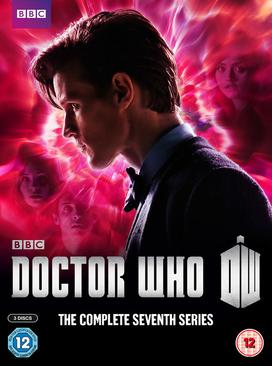
River Song is a fictional character created by Steven Moffat and played by Alex Kingston in the British science-fiction series Doctor Who. River Song was introduced to the series as an experienced future companion of series protagonist the Doctor, an alien Time Lord who travels through time in his TARDIS. Because River Song is a time traveller herself, her adventures with the Doctor occur out of synchronisation; their first meeting is with the Tenth Doctor, the Doctor's first and apparently her last. Kingston plays her in 15 episodes, as River becomes a companion, romantic interest and eventual wife of the Doctor in his eleventh incarnation portrayed by Matt Smith. The Twelfth Doctor is the last incarnation to meet her, spending a 24-year-long night with her, before her first meeting with the Tenth Doctor.

Amelia "Amy" Pond is a fictional character portrayed by Karen Gillan in the long-running British science fiction television series Doctor Who. Amy is a companion of the series protagonist the Doctor, in his eleventh incarnation, played by Matt Smith. She appears in the programme from the fifth series (2010) to midway through the seventh series (2012). Gillan returned for a brief cameo in Smith's final episode "The Time of the Doctor".

The fifth series of the British science-fiction television programme Doctor Who was originally broadcast on BBC One in 2010. The series began on 3 April 2010 with "The Eleventh Hour", and ended with "The Big Bang" on 26 June 2010. It was produced by head writer and executive producer Steven Moffat, who took over when Russell T Davies ended his involvement in the show after "The End of Time". The series has 13 episodes, six of which were written by Moffat. Piers Wenger and Beth Willis were co-executive producers, and Tracie Simpson and Peter Bennett were producers. Although it is the fifth series since the show's revival in 2005, the series' production code numbers were reset.

Rory Williams is a fictional character portrayed by Arthur Darvill in the long-running British science fiction television series Doctor Who. Having been introduced at the start of the fifth series, Rory joins the Eleventh Doctor as a companion in the middle of Series 5. As Amy Pond's fiancé, Rory is initially insecure because he believes Amy secretly loves the Doctor more. Later, however, he proves to be a hero in his own right and he and Amy get married. The couple conceive a daughter aboard the Doctor's time machine, the TARDIS, while in the time vortex, but their baby is kidnapped at birth. In "A Good Man Goes to War", Rory and Amy discover their time traveller friend River Song is actually their daughter, Melody Pond. The Doctor and River marry in "The Wedding of River Song", and Rory becomes the Doctor's father-in-law. In "The Angels Take Manhattan", the fifth episode of the seventh series, he and Amy are transported back in time by a Weeping Angel, leading to the couple's departure from the series.

"The Eleventh Hour" is the first episode of the fifth series of the British science fiction television programme Doctor Who, first broadcast on BBC One and BBC HD on 3 April 2010. The episode, written by then-new head writer and executive producer Steven Moffat and directed by Adam Smith, saw a complete change in cast and production crew.

"The Pandorica Opens" is the twelfth episode of the fifth series of British science fiction television programme Doctor Who, first broadcast on 19 June 2010 on BBC One. It is the first in a two-part finale; the second part, "The Big Bang", aired on 26 June. The episode was written by head writer and executive producer Steven Moffat and directed by Toby Haynes.
"Amy's Choice" is the seventh episode of the fifth series of the British science fiction television series Doctor Who. It first broadcast on BBC One on 15 May 2010. It was written by sitcom writer Simon Nye and directed by Catherine Morshead.

"The Lodger" is the eleventh episode of the fifth series of the British science fiction television series Doctor Who, first broadcast on BBC One on 12 June 2010. It was written by Gareth Roberts, who based the story on his 2006 Doctor Who Magazine comic strip "The Lodger".
"The Big Bang" is the thirteenth and final episode of the fifth series of British science fiction television programme Doctor Who, first broadcast on 26 June 2010 on BBC One. It is the second part of the two-part series finale; the first part, "The Pandorica Opens", aired on 19 June. The episode was written by head writer and executive producer Steven Moffat and directed by Toby Haynes.
"The Rebel Flesh" is the fifth episode of the sixth series of the British science fiction television series Doctor Who, which was first broadcast on 21 May 2011 on BBC One and on BBC America in the United States. It is the first episode of a two-part story written by Matthew Graham and directed by Julian Simpson, concluded in "The Almost People".
"The Impossible Astronaut" is the first episode of the sixth series of the British science fiction television series Doctor Who. The episode was written by show runner Steven Moffat and directed by Toby Haynes. It was first broadcast on 23 April 2011 in the United Kingdom on BBC One, the United States on BBC America and in Canada on Space. It also aired in Australia on ABC1 on 30 April 2011. The episode features alien time traveller the Doctor and his companions Amy Pond and Rory Williams, and is the first of a two-part story, which concluded with "Day of the Moon" on 30 April.

The sixth series of British science fiction television programme Doctor Who was shown in two parts. The first seven episodes were broadcast from April to June 2011, beginning with "The Impossible Astronaut" and ending with mid-series finale "A Good Man Goes to War". The final six episodes aired from August to October, beginning with "Let's Kill Hitler" and ending with "The Wedding of River Song". The main series was preceded by "A Christmas Carol", the 2010 Christmas special. The series was led by head writer and executive producer Steven Moffat, alongside executive producers Beth Willis and Piers Wenger. Sanne Wohlenberg, Marcus Wilson, and Denise Paul served as producers. The series was the sixth to air following the programme's revival in 2005 after the classic era aired between 1963 and 1989, and is the thirty-second season overall.

"The Doctor's Wife" is the fourth episode of the sixth series of the British science fiction television series Doctor Who, which was broadcast on 14 May 2011 in the United Kingdom, and later the same day in the United States. It was written by Neil Gaiman and directed by Richard Clark.

"Day of the Moon" is the second episode of the sixth series of the British science fiction television series Doctor Who. Written by show runner Steven Moffat, and directed by Toby Haynes, the episode was first broadcast on 30 April 2011 on BBC One in the United Kingdom and on BBC America in the United States. The episode is the second of a two-part story that began with "The Impossible Astronaut" on 23 April.
"Let's Kill Hitler" is the eighth episode of the sixth series of the British science fiction television series Doctor Who, and was first broadcast on BBC One, Space and BBC America on 27 August 2011. It was written by Steven Moffat and directed by Richard Senior.

The seventh series of the British science fiction television programme Doctor Who was broadcast concurrently on BBC One in the United Kingdom, and was split into two parts as the previous series had been. Following its premiere on 1 September 2012, the series aired weekly with five episodes until 29 September. The remaining eight episodes were broadcast between 30 March and 18 May 2013. The 2012 Christmas special, "The Snowmen", aired separately from the main series and introduced a new TARDIS interior, title sequence, theme tune, and outfit for the Doctor.
"The Doctor, the Widow and the Wardrobe" is an episode of the British science fiction television series Doctor Who. First broadcast on BBC One on 25 December 2011, it is the seventh Doctor Who Christmas special since the show's revival in 2005. It was written by Steven Moffat and directed by Farren Blackburn. Internationally, the special was shown on BBC America in the United States and on Space in Canada the same day as the British broadcast, with ABC1 in Australia showing it one day later.
Night and the Doctor is a series of five made-for-DVD mini-episodes of Doctor Who which were written by Steven Moffat. They were released as bonus features in the Complete Sixth Series DVD and Blu-ray box sets in November 2011. The first four are narratively linked, centring on the question, "What does the Doctor do at night when his companions are asleep?" and take place in the console room of the TARDIS. The fifth one precedes the events of the episode "Closing Time", possibly a prequel or deleted scene, though this remains unconfirmed by the BBC. No cast or crew were credited for any of the five episodes except for writer Steven Moffat.

"The Angels Take Manhattan" is the fifth episode of the seventh series of the revived British science fiction television series Doctor Who, which was first broadcast on BBC One on 29 September 2012. It is the last in the first block of episodes in the seventh series, followed by the 2012 Christmas special "The Snowmen". The episode was written by head writer Steven Moffat and directed by Nick Hurran.
"A Good Man Goes to War" is the seventh episode of the sixth series of the British science fiction television series Doctor Who, and was first broadcast on BBC One on 4 June 2011. It served as a mid-series finale. The episode was written by Steven Moffat and directed by Peter Hoar.













